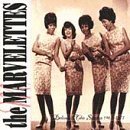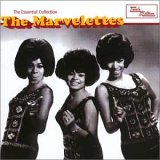|
The Marvelettes Biography -
|
One quintet, formed in 1960, just missed those spots. But according to one version of events, its teacher coaxed both the principal to make an exception and a Berry Gordy cohort to give the girls a listen.
"Gee!" (or just "G!") would have been an appropriate reaction from Georgeanna Tillman, Georgia Dobbins, Gladys Horton, Katherine Anderson, and Wyanetta Cowart. They'd entered the contest as the Marvels. But their original name, the Casinyets, squared with their good-natured modesty.
In the spring of 1961, the Marvels' Chantels-y, Shirelles-ean audition impressed Brian Holland and Robert Bateman (aka Brianbert). Still, the producers wanted one more thing from the teens: their own song.
That could have been daunting for some singing novices. But Dobbins borrowed the bluesy "Please Mr. Postman" from friend and songwriter William Garrett and upped the pop quotient. Brianbert ironed it further.
Either parental concerns or maternal illness prevented Dobbins from joining Motown with the rest of the group. She left before she even got to record her work.
But the song gave the other girls, new fifth voice Wanda Young, and Motown the boost they needed: As for the Miracles' "Shop Around," the public snapped up over a million copies of the feminized Marvelettes' "Please Mr. Postman."
 |
Individual members entered the mass consciousness. For example, Horton was the girlishly raspy lead. Anderson was "the tall one." Cowart had the curiously Hispanic name, which had changed from Wyanetta to Juanita.
"High school graduates" would not be among their titles: Work demands forced the girls to drop out.
They earned their letters, instead, through their songs. A follow-up to their first smash, "Twistin' Postman," then "Playboy," broke into the Pop Top 40 and Top 10, respectively.
So the Marvelettes were also excelling with numbers. Particularly with 1962's inviting "Beechwood 4-5789"!
"Strange I Know," but after that hit in 1963, they failed to lock up higher chart positions for songs like "Locking Up My Heart."
Or maybe not so odd. They couldn't have known that rejecting "Where Did Our Love Go" would more than help their rivals, the Supremes. But even with Motown's massive marketing resources, the group couldn't--or more damningly, the company didn't--establish a tidy "Marvelettes" identity.
Audiences loved the singers on tour. At Hitsville, though, respect was lacking. (Apparently, Motown later lost the Marvelettes trademark to a fake-acts promoter in, of all things, a card game!)
While other Motown artists roared upward in 1964, the Marvelettes stalled. TV worsened their embarrassment when Juanita Cowart made some comment that many found laughable. The subsequent mockery contributed to the strain of work and her nervous breakdown. She was barely into her 20s when her Motown dreams ended.
Internal unpleasantness didn't make life easier. After Gladys Horton's "Too Many Fish in the Sea" (by Eddie Holland and Norman Whitfield), Smokey Robinson showcased the sultrier Wanda Young on "I'll Keep Holding On" and "Don't Mess With Bill." Aside from her hits, the mid-1960s brought greater ego and drug abuse, plus mental ailments that would affect Young for decades.
Georgeanna Tillman's fainting spells also undermined the 1965 renaissance. Sickle cell anemia and lupus forced her to leave the quartet. (She did stick around Motown as a receptionist.)
 |
Like Tillman (who wed the Contours' Billy Gordon), family became a greater priority for Gladys Horton. She left the group, but Anne Bogan kept its number at three.
The trio's ultimate destination was anywhere but the Supremes galaxy. It remained earthbound, and when Motown moved to L.A., Wanda Young remained Detroit-bound. By the 1970s, the Marvelettes had closed their discography and careers with "A Breathtaking Guy."
A decade later, old ills still afflicted the members. Georgeanna Tillman never fully recovered her health, and died at 35 on January 6, 1980. The not-so-well-being of Wanda Young (or Rogers, after she wed the Miracles' Bobby) also persisted.
Katherine Anderson, the lone original member who saw the wonderful start and the gloomy finish, eventually quit entertainment. She'd married Temptations road manager Joe Schaffner, and devoted herself to helping children.
Gladys Horton revived the group with, briefly, Wanda Young, who joined in for a Motorcity recording in 1990. Jean McLain and Echo Johnson, Jackie and Regina Holleman, and others would also tour with the original leader.
Despite a Vocal Group Hall of Fame induction and book, the Marvelettes still haven't matched their old peers' success. Even this biography can't honestly include them with the "biggest" Motown stars.
But as long as their recordings--and fans!--exist, the girls singing there so patiently could one day rule R&B/pop history for real.
Would you like to get to know other Motown oldies singers after this bio of the Marvelettes? Just take your time browsing the homepage!